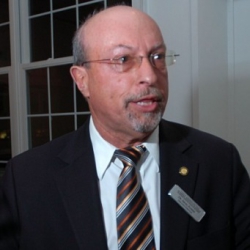
Dr. Posner Is Executive Director of the Lloyd D. Levenson Institute of Gaming, Hospitality and Tourism at Richard Stockton College
Israel Posner recently wrote an op-ed piece in The Press of Atlantic City which cited a phone poll earlier this year. In the article, Mr. Posner discussed what the poll meant for Atlantic City and the casino gambling industry of New Jersey.
Posner discussed whether the poll numbers indicated whether casino gaming should be expanded in the state and whether the focus in Atlantic City should be on becoming a non-gaming tourist destination. Because The Press of Atlantic City often sets the agenda for political discussions of gambling in New Jersey, that article is news in the online gambling press.
Stockton Polling Institute Survey
The poll cited by Israel Posner was one conducted via phone by the the Stockton Polling Institute. The poll was conducted early in 2014 and was commissioned by the Lloyd D. Levenson Institute of Gaming Hospitality and Tourism at Richard Stockton College. The poll had a margin of error of 3.7% and included 719 adult respondents from New Jersey.
The Stockton poll showed 83.7% of New Jersey casino gamblers had gambled in Atlantic City in the preious year. 28.1% had gambled in Pennsylvania, 12.8% in Nevada, 10.5% outside of the United States, and 8% had gambled in New York.
Atlantic City Casino Gambling
Ocean, Monmouth, and Camden are the three counties which show the most brand loyalty to Atlantic City. This is interesting, given Camden’s proximity to Philadelphia. One might assume the people of Camden County would prefer to gamble locally, but they seem to go out of their way to gamble in Atlantic City, instead of Philadelphia.
Ocean and Monmouth are part of the Jersey Shore, so it stands to reason they are more likely to prefer gaming along the Boardwalk. This isn’t likely to change, even if a new casino was placed on the Hudson River, like State Senate President Sweeney supports. What the polls show about the citizens in the area around New York City appears pivotal.
Pennsylvania Casino Gambling
Middlesex, Bergen, and Morris are the three counties most likely to gamble in Pennsylvania. Gamblers inside the northeastern parts of New Jersey show a definite preference for gambling in Philadelphia’s casinos, instead of Atlantic City.
If Senate President Steve Sweeney and those in favor of a Meadowlands casino place a gaming establishment in North Jersey, it appears that the traffic to Atlantic City wouldn’t be as hurt as it appears. Already, those gamblers spend more time in Philadalphia and New York state.
Keeping Up with the Joneses
When New York builds 4 new casinos and Philadelphia adds one to the downtown area, the numbers might change more dramatically. Under those circumstances, building a casino in North Jersey is going to make sense. Not only might such a casino keep more New Jerseyans in-state, but it could draw off New Yorkers and NYC tourists, if the casino is closer than Orange County (50 miles), where the nearest New York casino is expected to be.
Israel Posner’s Questions
In the Posner op-ed piece, a number of questions were asked. Posner asked, “What would be the impact on hospitality and tourism-related jobs as well as the tax base in Atlantic City and Atlantic County?
What are the costs and benefits of casinos in North Jersey?…What entities would be eligible for licensure? Only Atlantic City licensees/operators? Where, beyond Atlantic City, would casinos be permitted? Where would they not be permitted? What would a casino license permit an operator to run? Slots and tables? Sports book (if and when fully legal)? What would the operator’s obligations be? What should the tax rate be? Who/what should receive the tax benefits?”
Steve Sweeney Has the Answer
Recently, Steve Sweeney suggested that a casino in the north end of the state was not only desirable, but it could help save Atlantic City. He was discussing a tax on the casino which would bring in over $1 billion for Atlantic City over the next ten years. That money would be used to build infrastructure and help the city transition to a tourist (not casino) economy.
If the New Jersey State Senate and gaming regulators instituted a policy in which a significant percentage of the gaming revenue was directed to help Atlantic City reshape its approach to tourism, then several of Posner’s questions would be answered. The question of which areas might warrant a license is an important one. If New Jersey’s leaders choose the wrong location, they could see a huge investment trumped by a better situated casino in Pennsylvania or New York. Therefore, leaders around the state should take a close look at the questions posed.
